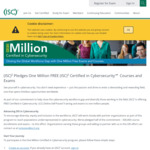Start Your Journey
To participate in the One Million Certified in Cybersecurity program, please follow these simple steps:
Create an account. If you already have an (ISC)² account, sign in.
Complete your (ISC)² Candidate application form and select Certified in Cybersecurity as your certification of interest.
Once the application is complete, you’ll become an (ISC)² Candidate. It’s free to join - your (ISC)² Candidate $50 annual dues are waived until September 2023. You’ll gain free access to Official (ISC)² Certified in Cybersecurity Online Self-Paced Training and a code to register for the free certification exam. You will find your access on the Candidate Benefits page.
Upon passing the exam, you’ll become a certified member of (ISC)² – the world’s largest association of certified cybersecurity professionals – with access to a broad range of professional development resources to help you throughout your career.
Q:
Can I take the exam online?
A:
The entry-level Certified in Cybersecurity certification exam will only be available in-person at (ISC)²-authorized Pearson VUE test centers
https://wsr.pearsonvue.com/testtaker/registration/SelectTest…
Please note: Upon passing the exam and becoming a certified member, your US$50 Annual Maintenance Fee will be due.


Hey guys, is there anyone here in the cybersecurity industry that can advise a pathway into the career? Is this a good start? Hard to find legit forums for Aus Thank you